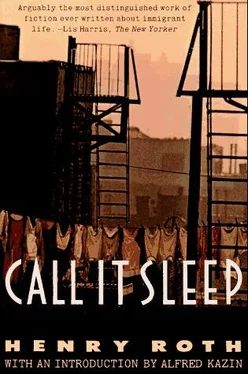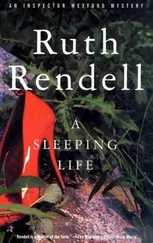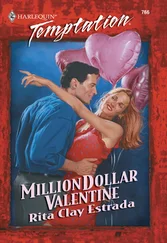“They?” he snapped eagerly.
“They!”
“Aah!” His suppressed cry rattled exultantly in his throat. “Giddap, Billy! Giddap!” He dragged savagely at the left rein. The horse mounted the sidewalk. The wagon heeled over, shifting its cargo with a roar.
“Cheesit, Augie!” the stocky one yelled out suddenly. “He’s after us!”
They broke into a clumsy run, the shorter one lagging. The wagon gained. With a hoarse cry of “Let ’im have it, Wally!” the lean one slowed down momentarily, drew back his arm. The heavy bottle arched toward them hung in the sun, shattered like a bomb before the horse. He reared, flung his head sideways, nostrils crimson, wild eyes rolling. A second later, another bottle flew in the air, fell short, smashed on the ground. Again the whip flashed down.
“Now I’ll get you!” His father gnashed his teeth. “Now I’ll get you!” And David knew they were doomed.
The charging horse bore down on them. At the corner, with only a few yards between them and the wagon, both men as if by a common impulse, shoved each other in opposite directions. His father turned after the stockier running on the sidewalk. A moment more, the horse was abreast. One yank at the reins and the reins were flung at David. “Hold, you!” Whip in hand, his father leaped from the rolling wagon into the street. The fugitive, trapped before a stable door that wouldn’t open, spun about, crouched savagely at bay.
“Waddayuh chasin’ me fuh?” His yellow teeth were bared, the round eyes now slits of fear and fury.
“Hanh!” His father’s snarl was almost like laughter, but the grinding of his teeth creaked like a strong cable stretching. “Yuhv’ll take my milk!”
“Me? Waddaye shittin’ about? I never seen it.”
“An’ de bottles you t’rew?” He seemed merely to be toying with the man. David knew the answers didn’t matter. He grew faint, waiting for the end.
“Yea! I t’rew ’em!” The other was blustering savagely. “An de nex’ time watch out who de fuck yer chas—”
Swish! The hiss of the whip cut off his words; the long, stiff thong curled over his shoulder, whacked!
“Owoo!” he howled with pain and fury. “Yuh Jew bastard! You hit me?” He flung himself at David’s father, arms thrashing.
“Hanh!” Again that mad cry of mirth. One long, rigid arm shot out, thrust his kicking, flailing adversary back like a ram — while the whip lashed out in the other. Again! Again it fell! It sickened David watching it. He screamed. Suddenly with a sharp crack the whip snapped. His father flung it aside. And as the other, howling with rage, charged in to tackle, he drew up his fist, clenched it like a sledge, and grunting with the effort, crashed it down on his neck.
“Uh!” A small, almost infantile groan broke from the man’s open mouth. Then he crumpled, slid down David’s father’s legs and fell sideways to the ground. Once more he stirred, the cap slipping from his head. The vague, sparse strands of his hair sank leisurely to one side as if on a hinge, revealing the splotched yellow scalp. He lay still.
For a moment longer, David’s father towered above him, rage billowing from him, shimmering in sunlight almost, like an aura; then with a last, fierce glance about the empty streets, scooped up the broken whip, stalked to the wagon, leaped in, and leaning out flogged the horse with the end of the rein. The beast bounded forward. Swiftly they left the street, turned south, mingled with the gathering traffic.
The minutes passed in horrible silence. Little by little, his father’s dark face grew grey, the fierce blaze in his eyes clouding. In his trembling hands, the reins began to shake out in tiny ripples. His hoarse breath grew louder, rushing through his burred throat in short violent gasps that set his jaw quivering each time as if on springs. In Brownsville was the last time David had seen him look that way. It recalled all the old horror.
“You!” He said at last, and his words were so harsh and guttural, they barely took form. “False son! You, the cause!”
His hand moved. Like the fangs of a snake the brass-buckled ends of the reins bit twice into David’s shoulder. He never winced. He hardly even felt them, so frozen with terror he was.
“Say anything to your mother,” the strangled voice went on, “and I’ll beat you to death! Hear me?”
“Yes, papa.”
Amid a crowd of trams and autos, they moved slowly toward Ninth Street.
IV
NOT another word had been spoken. The wagon rumbled over the cobbled car-tracks, wheeled around, drew up beside the curb.
“Get off, dunce!” His father’s voice had cleared, was sharp again; his color was beginning to return. “Now remember what I said — be silent!”
Mutely, David climbed down the wagon.
“And don’t get lost!” he flung down at him. “Straight to the cheder!”
“Yes, papa.” He could feel the stupidity of his own gaze.
“Unh!” he grunted disgustedly. “Hurry now!” Then he clucked to the horse and the wagon clattered north again.
With stunned, shuffling gait, David crossed the street, plodded toward the cheder.
— Mustn’t tell her! Mustn’t tell! Ow!
How could he contain it! He had but to prolong the wink of his eyes a moment longer and the horrible scenes of that hour flared across his eyelids as on a screen — The ghastly flickering of stolid gas-tanks, cobbles, trenches, distance, the malevolent streets, the black arc of the whip still lingering in air though the whip had landed, the vicious face contorted, and the hand, the hand uplifted. In the meaningless sounds of the street, he could still hear the scuffing of their feet, his father’s grunt, the thud of his fist, the howls of rage and pain. The fearful images would not be shaken, but clung to his mind as though soldered there. Something had happened! Something had happened! Even Ninth Street, his own familiar Ninth Street was warped, haunted by something he could feel; but perceive with no sense. Faces he had seen so many times he scarcely ever glanced at any more were twisted into secret shadows, smeared, flattened, whorled, grotesque grief and smirking never before revealed. The cheder corridor as he passed through it, scribble of chalk glimmering on the wall, linoleum battered into traps, seemed un-level, weird and endless. He caught himself fighting the old fear of hallways; his step suddenly quickened. Saw-toothed, bizarre with inlayed wedges of light and shadow, the cheder yard, grey wash-poles aslant in heavy light, fences leaning, chipped, red walls, walls sodden with sun, the hacked sky. Unreal. The cheder itself, whispers in sudden gloom, knotted figures, cracked benches, the long table, the inane, perpetual drone, fantastic forms, perspectives. Unreal.
Something, something had happened. He sat dumbly down, watched the others a moment, then turned away. Their bickering and their chatter had lost dimension; nothing was left but a grey and vacuous idiocy, a world bewitched and hollow. It was as though he heard all sounds through a yawn or with water in his ears, as though he saw all things through a tumbler. When would it burst, this globe about his senses?
If only he had run home first, if only he had told his mother.
Time dragged on. The cheder filled up. Fortunately for him he had come early — he would read soon, escape. Remotely he heard his name called as if through a wall. He rose, shuffled to the bench as though his will alone were dragging the whole clog of his body, sat down before the table.
“You look somewhat pale,” the rabbi said quizzically as he flattened out the book, “Do you feel squeamish today? Ha?”
“No.”
“Well, why weren’t you waiting your turn on the bench?”
“I didn’t know.”
Читать дальше












